- Home
- Julie Smith
Louisiana Hotshot Page 17
Louisiana Hotshot Read online
Page 17
He snorted. “See? That’s Miz Clara.”
“I don’t know. This sure seems like a stupid thing to keep secret.”
For once, he did look at her. “I agree. I agree with you. But do me a favor— please save my behind and don’t tell Miz Clara we talked about any of it. Promise?”
“I don’t know.” She was dead against it.
Corey looked at his watch. “It’s getting late, you know that? Michelle’s going to kill me. Hey, listen, there’s something I’ve been meaning to ask you.” His mood had lightened— he seemed almost happy, almost normal, as opposed to the Type-A Corey she was so used to.
“Okay. Sure.”
“I was kind of wondering— how come Michelle and I have never met your beau?”
“My beau?” She was taken aback.
“Darryl.”
“Oh, yeah, I know who you mean. I just thought—”
He chuckled. “Quaint usage, huh?”
“I’d say so.” She couldn’t help laughing as well— Corey was actually making fun of himself, an unprecedented occurrence.
“How come you haven’t introduced us?”
“That’s funny— I really don’t know. I guess the time hasn’t been right.” In truth, it had never occurred to her to introduce Darryl to Corey and Michelle. She preferred to tell him amusing stories about her stuck-up, pompous ass of a brother and his BAP of a wife.
“How about we make a date?”
“Oh. Okay. Sure.”
“You don’t seem that enthusiastic.”
“No, really. Let’s do it. How about Saturday?”
He frowned. “Umm. No go— already booked. Tomorrow’s good, though. How about tomorrow?”
“If Darryl’s free, you’ve got a deal. How about something simple? Sid-Marr’s, maybe.”
“Oh, no. Hell, no. We don’t go out that often. We’ll take you to Brigtsen’s.”
“Who could say no to that?” And yet, she kind of wished she could; kind of, but not really. She also kind of liked the idea.
But, driving home, she felt disoriented— the dad thing, the Darryl thing, the baby thing. You name it, it was wearing her out. She felt as if she’d eaten a meal of chocolate bars— unsatisfied and undernourished, with a strange, sticky taste in her mouth.
Chapter 16
She was wired, and it wasn’t late— only twenty of eleven. She pulled out her cell phone and called Darryl from her car. “You’ll never guess what. Brace yourself— it’s not all good.”
“I’ve got it: Oprah wants you— but only if you clean up your language.”
She laughed at the ludicrousness of either possibility. “This is only slightly less likely. My brother wants to meet you.”
“Hey. What’s so weird about that? I’m an okay dude; halfway famous, even.”
“No, it’s weird for him to be interested in me. He wants to take us to Brigtsen’s. Tomorrow.”
“Oh, hell, I’m playing the governor’s mansion.”
“Oh.”
“What do you mean ‘oh’? Tomorrow’s good. Count me in.”
Talba was quiet. She’d half hoped he’d refuse.
“What’s wrong,” he said. “You don’t want to do it?”
“No, I just… I’m going to be with you tomorrow, and it’s late, and everything… ”
“So?”
“Well, okay. I was kind of hoping to see you tonight. But I guess that would be superfluous. I mean, I know it’s a school night and everything.”
“Talba, what’s wrong?” If he’d sounded tired, he didn’t now. His voice was all concern and alertness.
“Nothing. I just wanted to see you.”
“Should I put the coffeepot on, or chill the wine?”
“Wine. Definitely wine.”
Darryl had recently moved to Algiers Point, and a more peaceful place would be hard to imagine. It was part of Orleans Parish— therefore part of the city— but it was on the west bank of the river. Though the houses were strictly old New Orleans— neat little shotguns and larger Victorians— it had the sleepy feel of a small town. Each well-kept home was set back from the street on a nice-sized yard, and the residents took pride in their gardens.
Young families could afford to live there— and did— but because of the neighborhood’s age and a sprinkle of gay couples, it escaped the sterility of a suburb. Darryl said he’d picked it because the price was right and on the weekends it was like being on vacation. Talba, who frequently visited for the weekend, had to agree— yet if you wanted dinner, you got on the ferry and six minutes later got off in the French Quarter.
She went by ferry tonight, thinking how odd it was to be going there this late, and in the middle of the week. I should call Miz Clara, she thought, and yet it was really too late. Maybe that was good. If she stayed over, she could go home after Miz Clara left for work. She didn’t much want to see her mother right now.
Darryl met her with a glass of wine in each hand. “For you, Your Grace.”
“Woo. Do I need it. I’ve had one hell of a day.”
“Sit down and tell me.” Darryl had guy furniture— big and comfortable. He liked to sit in an old, beat-up leather chair he’d gotten at a garage sale, with his feet on an ottoman. Talba, in turn, would lounge on the deep, soft sofa upholstered in brick red corduroy.
They assumed the positions, Talba setting her drink on a massive wooden coffee table. She looked around her, getting her bearings. “I love this room.”
“Come on. Talk.”
“I’m feeling better. Really. Just being here.”
“Talk, girl.”
“Okay, here’s the short version. The day started out with a prayer breakfast, moved on to almost getting fired, getting frozen out by one person, yelled at and chased by another, and finding out my father’s dead.”
Without missing a beat, he picked up on the relevant part. “Your father’s dead?”
“If Corey isn’t lying. Which he might be. Everyone seems to be trying to keep me from finding out anything about my father.”
“Oh, God. This is tied in with that funeral thing, isn’t it?”
Talba, lying down on a fat cushion, stared up at the ceiling. “Well, now, my mother says I’ve never been to a funeral, and if I ever mention my father’s name, she’ll throw me out of the house. However, two days ago I couldn’t mention my father’s name because I didn’t know it. My aunt, who practically threw me out of her house, finally deigned to tell me it was Denman La Rose.”
“Your mother wasn’t married?”
“Oh, yes. It was Denman La Rose Wallis. But that’s all I know. No matter what else I ask, a hundred roadblocks go up. Nobody wants to talk about him, but most of all, nobody wants me asking about him. Finally, I went to Corey, and you know how desperate I had to be to do that.”
“More wine?” He poured them both a glass. She was beginning to feel better. The wine was helping, but mostly, being with Darryl was, in his peaceful, comfortable little house.
“Darryl. This really means a lot to me.”
He held out his glass. “I know. But don’t worry— they have AA chapters everywhere.”
“You know what I mean.”
He smiled at her. “Glad to be of service, ma’am.” They locked eyes for a moment. Darryl broke first. “So what’d Corey say?”
“He told me our father is dead— even though Miz Clara told me he wasn’t. You know Miz Clara’s lying thing? How she never will lie, but if she can wiggle around the truth, she doesn’t think it’s the same thing?”
He laughed. “No, but it sounds right for a church lady.”
“Well, she wiggled and she lied. Or else Corey did. I realized it on the way over here. She says I’ve never been to a funeral; he says I was at my father’s, and that must be why I had that weird experience at Rhonda’s. She also says he’s not dead— but that’s the wiggle part. What she really said was ‘wish he was,’ or something like that.”
Darryl considered. “Hmm,” he said fi
nally. “Are we overanalyzing?”
“About Miz Clara, maybe. Who knows what she’s up to? But, still, it remains clear no one wants to talk about the man.”
“Talba, has it occurred to you that something really bad happened. Like maybe he…”
“Molested me?” Her stomach gave a little shudder. “Yeah, I’ve thought of it. Maybe she found out and threw him out. Kind of depressing, isn’t it?”
“How old were you?”
“Two.”
“Jesus.”
“Yeah.” Once again, she inspected the ceiling. “But I just thought of something. It’s perfectly in character for Mama and Aunt Carrie to behave like this. But what about Corey? He’s a doctor. He must be aware that you’re supposed to talk about these things. Like— you know— how can you have a healthy relationship with a man if…”
“Hey! Maybe that’s why he wants to meet me.”
“What?”
“You know. To vet me. Make sure I’m not a pervert. See if we really do seem healthy.”
Talba sat up, suddenly amused. “Oh, man. What an opportunity. You got a dog collar I could wear? Something with spikes, maybe. And I could get a nice latex dress…”
“See? You’re better. All you needed was a drink with Uncle Darryl.”
“That’s not all, Uncle Darryl.”
“Well, it’s all you’re getting. School night, remember?”
“Never stopped you before.”
“Okay, Your Grace. Anything you like.”
She shook her head. “No, I’m kidding. To tell the truth, tonight a good long cuddle’s more to the point.”
“That’s what I thought.”
“Listen, I want to ask you something. You know that poem, ‘Queen of the May’? You said you’d like to be a father like that.”
“Uh-huh. I would.”
“Well, I was wondering— what kind of father are you?” She paused, but he didn’t answer. “I mean— how come you never talk about your kid?”
“Oh, man. Let’s don’t get into that.”
She looked at him hard. “More secrets?”
“Raisa’s a great kid. I wish I could see more of her.” He stared at the old-fashioned ottoman with his Nike-clad feet on it. When he looked up at her, he was clearly so miserable she wished she could withdraw the question. “What made you ask?” he said.
“Nothing. I didn’t realize it was such a sensitive subject.”
“It’s not. Really.” He gave her a smile so forced it looked squeezed out of a toothpaste tube. “What brought it up?”
“I just thought… with Corey suddenly asking to meet you… I was wondering why I’ve never met Raisa.”
“Oh.” He sat back in his chair and blew out his breath. “Good question.”
“Maybe for another occasion?”
“Almost certainly for another occasion. Are you staying here tonight?”
“If I may.”
“I insist.”
She couldn’t imagine Darryl having a secret. And yet, he hardly ever talked about his daughter. Never, in fact, except to mention her in passing.
Hours later, she blinked awake, terrified, Darryl touching her face. “Talba. What is it?”
“Whooo. Nightmare.”
“You’re soaking wet. You were moaning.”
“There was all this blood… a horrible noise, and then people split open, and blood poured out of them. Rivers, I mean. Like a cartoon or something. It was like rain— it just kept getting deeper and deeper and deeper.”
“What kind of noise?”
“I don’t know. Like a crash. A boom or something.”
“A gunshot, maybe.”
“Too loud, I think.” She shuddered. “Can I have some water?”
He got her some as if she were a child, and once again, she fell asleep in his arms. She felt as if she might cry when he got up and dressed and left for school.
It was raining out, and she fell easily back to sleep. Eddie was right. She needed to decompress.
She slept as long as she could and went in to make herself some toast. Darryl had made coffee for her. Maybe, she thought, I should marry him.
But you could hardly marry a man who didn’t know your brother. And who had a kid he never talked about. I wonder, she thought, if we really do have such a healthy relationship. God knows I’m no judge.
One thing she did know— Darryl made her happy when many men had made her cry. Good enough, she thought. Good enough. And Miz Clara likes him.
On the other hand, Miz Clara might not be infallible in these matters— by all reports she’d chosen poorly herself.
The rain made her want to stay put, but there was little point without Darryl there. Her own house— Miz Clara’s house— seemed lonely without her mother, who had left a tart note asking please to call her at work and say whether she was dead or alive. It brought a small lump to her throat, made her realize how accustomed Miz Clara had become to their arrangement.
Originally, her mother had permitted her to move back in for a reason— she had some poems to write, and a project to do, involving her given name and the intern who’d stuck her with it. When she’d gone back to her day job— which she roughly thought of as “computer genius”— she had never moved out. Neither she nor her mother had ever mentioned it. She’d just started working for United Oil, paying rent, and putting money into the house when it needed something.
Of course, she’d met Darryl in the original move-back period. If she had had a different boyfriend— somebody like Lamar, the last one, Miz Clara would have thrown her out on her ear. But she was probably more smitten with Darryl than Talba was; she was happy to put up with her daughter to have him around.
Talba dressed for work, but it was only midmorning. She was so depressed, so disoriented as a result of yesterday’s events, that she thought of going in early.
Instead, she did a search on the name Denman La Rose Wallis. As expected, she came up with nothing. It was an odd name.
Well, hell, she thought. If I want to see it written down, I know where to go.
After a maddening phone search to find where the records she wanted were kept, she drove to the State Building, went to the Office of Vital Records, and applied for three documents: First, a copy of the marriage certificate for Clara Suzanna Guidry and Denman La Rose Wallis. It cost her, but she asked also for the birth certificate of Urethra Tabitha Sandra Wallis, grateful she had to write the name so she wouldn’t have to say it.
The cruelty of the name— to Miz Clara; she didn’t care about herself— at one time had made her so angry it ran her life. But now her mother’s innocence moved her more. That, and her genuine wish to give her daughter a pretty name. Her second name, indeed, was not TABitha, but TaBEETHa, to rhyme with Urethra.
Third, she requested a copy of the death certificate for Denman La Rose Wallis.
And then she settled down to wait. After an hour, she left, cursing bureaucracy and uncooperative civil servants. She tried to walk off some of her nervous energy, returning flushed, sweaty, and just as antsy as before. She still had to wait another twenty minutes.
Finally, having sweated a quart of blood, she had the documents— at a collective cost of $27, the marriage license being the cheapest. She folded them carefully into her purse and found a place to have coffee before she looked at them. Urethra Tabitha Sandra Wallis (later to become the Baroness de Pontalba) had been born to Clara Suzanna Wallis and Denman La Rose Wallis in 1977. Seven years later, her father had died. That was wrong, she thought. Corey had said she was only two when he died. Had he made a mistake or lied? She looked at the cause of death: Gunshot wound to the chest. Not an overdose. He had lied, and about more than one thing. She was seven at the time, not two.
No one, it seemed, could be trusted on the subject of her father. She closed her eyes in frustration, and immediately felt sick, felt something the size of a porpoise leap out of her stomach and into her throat, something slimy and thrashing. Something she recogni
zed.
It was fear.
The world in front of her, the backs of her eyelids, turned red. She snapped them open, but it didn’t help. She felt as if her body was swaying, as if she might fall. She closed them again, against the disorientation, and she was a child, almost a baby. Someone was lying on the floor on an old rag rug, bleeding from the chest, and there was an ancient red upholstered chair in the room. The loudest noise she’d ever heard echoed in her ears.
The memory— if it was that— flitted so quickly away she had only the vaguest impression of the person on the floor, but the room was vivid. And the fear was monstrous. The leaping porpoise had grown quickly to the size of a whale, and it was no longer in her throat, but had liquefied and seeped into her cells, contaminating them and making it impossible to focus, even to…
She felt a steadying hand on her back. “Are you all right, Miss?”
She turned to look at the good Samaritan, a white man. “I think so. I…”
The look on the man’s face stopped her cold. “Put your head down,” he said. “Head on your knees.” He helped her lower it. She wondered if she was going to throw up.
But in fact she felt better in a moment, and the man, holding the back of her neck, let her up. “Are you ill?” he asked.
She faked a smile. “I’m fine, I think.” She held up her cup. “Too much sugar in my coffee. Thanks for your help. I’m okay. Really.”
He said she was welcome, and walked away frowning, as if he didn’t feel his work with her was done.
And truth be told, she still felt shaky. I was there, she thought. I saw him die. And I wasn’t any two, either. I had to be seven. Why’d Corey tell me two?
Why, in fact, had anyone told her anything, even that she should keep her nose out if it? They were trying to protect her, she knew that, but from what? Not just the memory of her father bleeding, though that was plenty.
More than that.
Talba thought about it hard, and tried to come to terms with the notion that her mother might be a murderer. She wondered how to research it. First the newspaper, she thought, but there must be something else. Police records? Could she ask Skip Langdon?
No, she could not. No way in hell. And she was suddenly aware that she wasn’t going to look it up in any newspaper files, either. She was going to forget about it. She hated to admit it, but they’d been right, the whole damn batch of them. She was wrong to pry into this thing, and she was going to drop it.

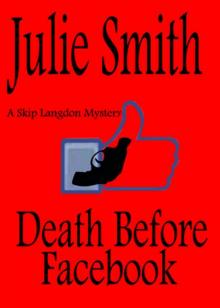 Death Before Facebook (Skip Langdon #4) (Skip Langdon Mystery) (The Skip Langdon Series)
Death Before Facebook (Skip Langdon #4) (Skip Langdon Mystery) (The Skip Langdon Series)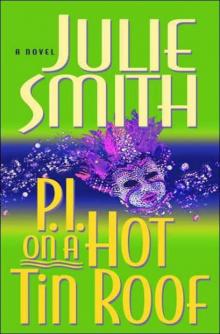 P.I. On A Hot Tin Roof
P.I. On A Hot Tin Roof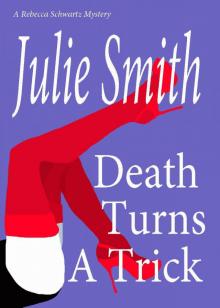 Death Turns A Trick (Rebecca Schwartz #1) (A Rebecca Schwartz Mystery) (The Rebecca Schwartz Series)
Death Turns A Trick (Rebecca Schwartz #1) (A Rebecca Schwartz Mystery) (The Rebecca Schwartz Series)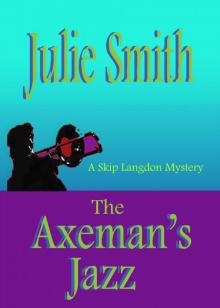 The Axeman's Jazz (Skip Langdon Mystery Series #2) (The Skip Langdon Series)
The Axeman's Jazz (Skip Langdon Mystery Series #2) (The Skip Langdon Series)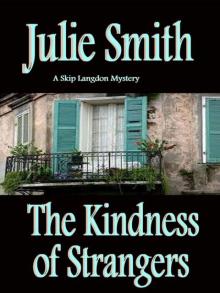 The Kindness of Strangers (Skip Langdon Mystery #6) (The Skip Langdon Series)
The Kindness of Strangers (Skip Langdon Mystery #6) (The Skip Langdon Series)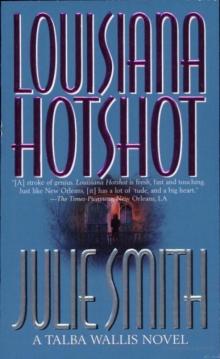 Louisiana Hotshot
Louisiana Hotshot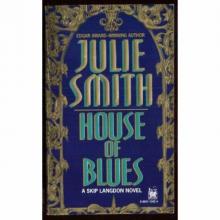 House of Blues
House of Blues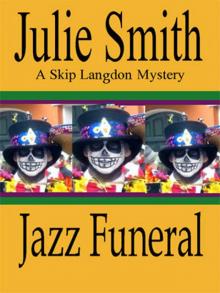 Jazz Funeral (Skip Langdon #3) (Skip Langdon Mystery) (The Skip Langdon Series)
Jazz Funeral (Skip Langdon #3) (Skip Langdon Mystery) (The Skip Langdon Series)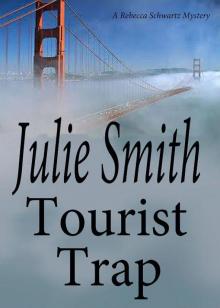 Tourist Trap (Rebecca Schwartz #3) (A Rebecca Schwartz Mystery) (The Rebecca Schwartz Series)
Tourist Trap (Rebecca Schwartz #3) (A Rebecca Schwartz Mystery) (The Rebecca Schwartz Series)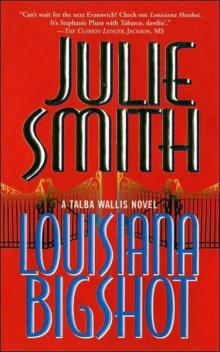 Louisiana Bigshot
Louisiana Bigshot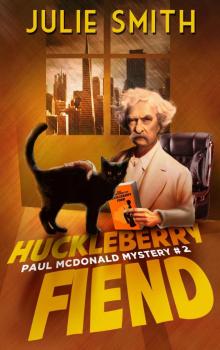 Huckleberry Fiend
Huckleberry Fiend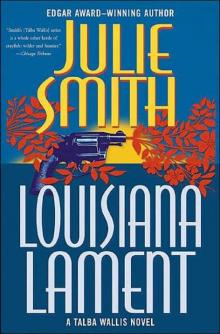 Louisiana Lament
Louisiana Lament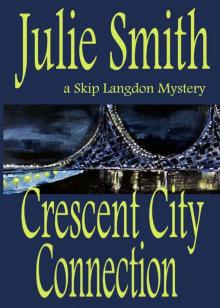 Crescent City Connection (Skip Langdon Mystery #7) (The Skip Langdon Series)
Crescent City Connection (Skip Langdon Mystery #7) (The Skip Langdon Series)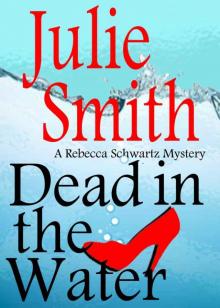 Dead In The Water (Rebecca Schwartz Mystery #4) (The Rebecca Schwartz Series)
Dead In The Water (Rebecca Schwartz Mystery #4) (The Rebecca Schwartz Series)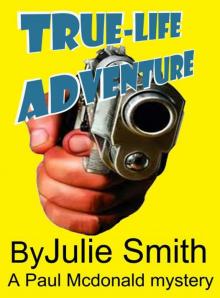 True-Life Adventure
True-Life Adventure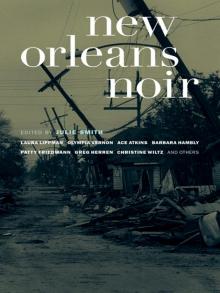 New Orleans Noir
New Orleans Noir